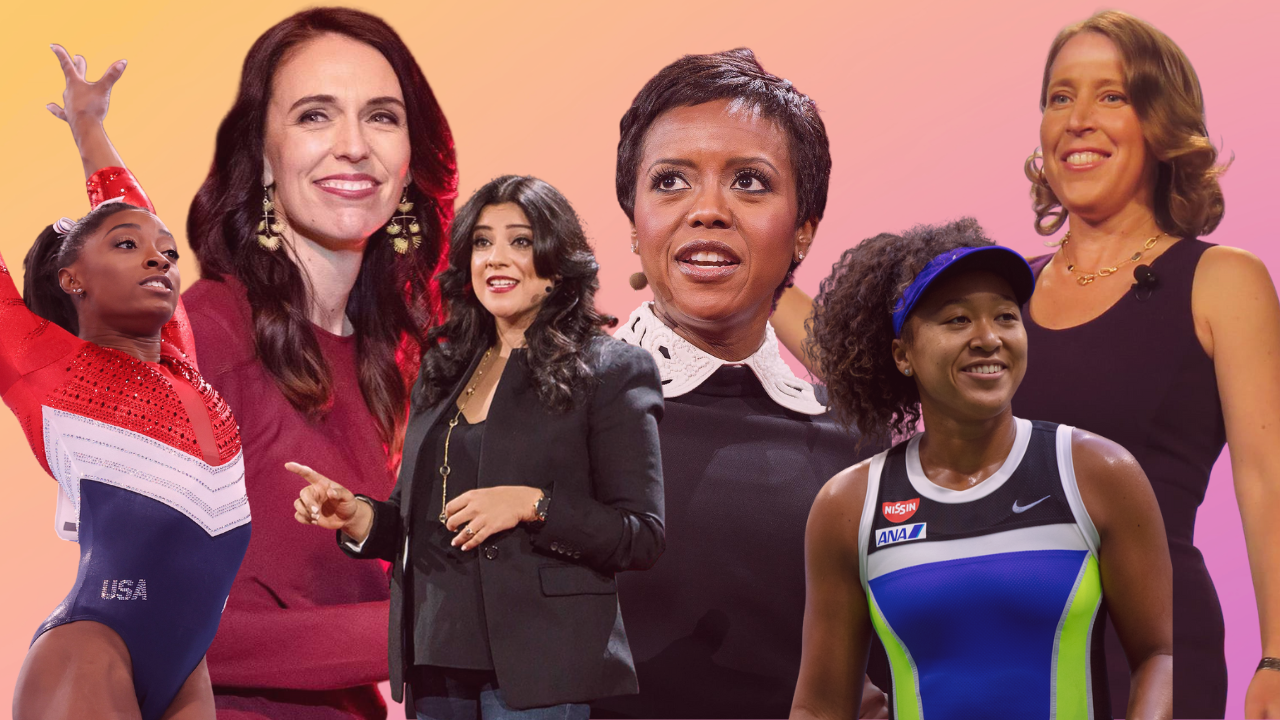This March for Women’s History Month, I want to recognize the women who have blazed trails challenging the status quo and making paths for generations of women to follow. These are women who have made history and are still making history- right now.
I also want to focus specifically on women who are expressing leadership in different ways and who aren’t trying to fit into the dominant, male paradigm for leadership.
These are women who have and continue to change the ways we lead. These are women who are changing the face of power.
When we have more women in leadership, we no longer need to cling to the few who have risen. They can come and go, and they don’t need to drain their whole lives to lead. They can have a new life, a new life, and a new life. And they can touch even more lives.
These women are not only some of the firsts, but they’re also women who are stepping up, taking care of themselves, and — possibly most importantly — stepping down when they need to.
1. Jacinda Ardern
I can’t talk about women in leadership — especially ones who have paved the way and stepped up — who also are taking care of themselves by stepping down, without talking about Jacinda Ardern.
Ardern is such a huge role model. After just over five years as New Zealand’s prime minister, her list of accomplishments is long.
She banned military-style firearms after the shooting in Christchurch in 2017. New Zealand had one of the lowest COVID-19-related mortality rates in the world, and her administration’s response to the pandemic is credited to that. She has been named one of the world’s most influential people by Time Magazine — twice.
Yet, despite a landslide victory in 2020, Ardern announced in January that she was stepping down as prime minister, citing, “I’m leaving, because with such a privileged role comes responsibility, the responsibility to know when you are the right person to lead and also when you are not. I know what this job takes. And I know that I no longer have enough in the tank to do it justice. It’s that simple.”
The writing was on the wall, in some respects, but she just stepped away and took care of herself.
2. Reshma Saujani
Another woman who has broken glass ceilings — and made a name for herself by stepping back, stepping down, and changing lanes — is Reshma Saujani, possibly most famous for her non-profit, Girls Who Code.
So far, this non-profit has taught over 500,000 girls, women, and nonbinary people to code through immersion programs, clubs, and college loops.
Her list of accomplishments includes three bestselling books and two non-profits. Girls Who Code has helped hundreds of thousands of women enter the field of technology. She’s the daughter of refugees, a Yale Law graduate, and the first Indian-American woman to run for Congress.
“I was constantly told, ‘It’s not your turn. Wait in line. It’s not your turn,” she told Marie Claire last year.
In 2021, Saujani stepped down from Girls Who Code to start her newest non-profit the Marshall Plan for Moms. Hoping to change the narrative around “doing it all,” the Marshall Plan aims to change the workplace to make it more equitable for moms.
3. Susan Wojcicki
Another woman who stepped down this year to focus on family is Susan Wojcicki, CEO of YouTube, since 2014.
What a lot of people don’t know about her is that she was with Google from the start — and if it weren’t for her, the company may not have acquired YouTube at all. It was because of her that Google stopped trying to create a product to compete with YouTube and instead just… acquired it.
Not only was Wojcicki the 16th employee of Google, but she rented out her garage to co-founders Larry Page and Sergey Brin when the company was just starting up.
In February, she stepped down, citing, “after nearly 25 years here, I’ve decided to step back from my role as the head of YouTube and start a new chapter focused on my family, health, and personal projects I’m passionate about.”
Oh, and she’s also now getting her own Barbie.
4. Mellody Hobson
Mellody Hobson is president and co-CEO of Ariel Investments, chairperson of Starbucks Corporation, and former chairperson of DreamWorks Animation.
She started as an intern at Ariel Investments and went on to become president and co-CEO. To top it all off, she’s a tireless promoter of women, who is dedicated to closing the racial wealth gap.
She was named one of Forbes’ World’s 100 Most Powerful Women in 2020, and she was the first black woman to be named chairperson of an S&P 500 company.
Hobson is also starting a private equity fund called Project Black, to create a pipeline for black c-suite executives.
5 & 6. Naomi Osaka/Simone Biles
Two women in sports who I’m honoring right now are Naomi Osaka and Simone Biles. Both have made headlines for putting their mental and physical health ahead of their careers. And both have gotten pushback for this.
In 2021, Osaka famously declined to attend press conferences at the French Open, citing her mental health as the reason.
“For me, I felt like it was necessary, but I kind of felt ashamed in that moment because as an athlete you’re kind of told to be strong and push through everything, but I think I learned that it’s better to re-group and adjust the feelings you have in that moment and you can come back stronger,” she said on Good Morning America.
In the same year, she withdrew from Wimbledon, citing mental health reasons.
Then, Osaka (who is a four-time Grand Slam singles champion) withdrew from the Grand Slams in 2022, due to an Achilles injury.
Though she initially felt shame and guilt for doing so, she told Stephen Colbert, “if I am feeling this way, why would I keep pushing through it, when I can confront it and fix it and then continue on my journey?”
Another athlete who inspires me is Simone Biles. She famously withdrew from the final individual all-around competition at the Tokyo Olympics.
Like Osaka, she received criticism for this. But doing so not only saved her mental health — but it probably also saved her life. She was suffering from what she called the “twisties” when she withdrew, a phenomenon where some gymnasts may lose control when doing twists.
“It’s so dangerous,” she told NPR in 2021. “It’s basically life or death.”
While this move drew a lot of criticism from fans, it also started a nationwide debate about mental health.
Just because someone steps down, it’s not failure. The more women we have in leadership, the less that we need them to remain in leadership for 30 years (or more!).


